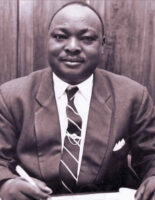
Joseph D. Otiende was a pioneer educator, politician, administrator, freedom fighter, MP and Cabinet minister, and he is still engaged in community leadership in Western Province.
With others, this nonagenarian offered selfless service that led to political independence and provided the building blocks of Kenya’s nationhood. He held several Cabinet dockets in President Jomo Kenyatta’s Government — Education, Agriculture, Culture, Health and Housing. He lost the Vihiga parliamentary seat in 1969 and did not contest again, opting to retire from politics when he was hardly in his 50s.
In a recent interview, Otiende said the role he played in life was shaped right from his childhood. He says of the 1920s, when he started school: “My father was a teacher and a cleric. He appreciated education and its benefits even in those early days when its importance had not quite sunk in the populace.”
Otiende was born in 1917 in Akelo village, Vihiga, where he still lives. He recalls that his father not only ensured that he received an early education, but was also responsible for the education of many other children in the Maragoli, Kisumu and Maseno areas, where he preached the Gospel and rooted for education. Wherever he was posted, he went along with his family. This had a lasting impact on Otiende, particularly the exposure to the languages and cultures of communities other than his Maragoli. Before he joined his first institution, Butere Normal School, he had been told that all knowledge came from the Bible. This was because his father always read the fairly “big book” at home and on the pulpit.
When the Church Missionary Society established a school at Maseno in 1926, Otiende was one of the first pupils. His other classmates included Oginga Odinga and Anglican Church Archbishop Festus Olang.

He recalls: “Even though we were still young, Jaramogi and I discussed politics and had our sights focused on future leadership.”
Olang showed predilection for religion from an early age. Because they were boarders, the bonding among the pioneering students was enhanced and they treated one another as brothers.
Otiende says Maseno has a special place in his heart for the all-round exposure the European missionaries-cum-educators inculcated in him and his schoolmates — strong spiritual and secular learning.
When he joined Maseno, the only culture other than his own that he related to was Luo. At the time, the colonial government operated a policy akin to apartheid. Communities were not allowed to mingle freely lest they conspire against the oppressors. If boys from other communities in western Kenya exposed young Otiende to cultures other than his own, this was intensified in 1930, when he joined Alliance after excelling at Maseno. “For me, the breaking of inter-tribal barriers took an irreversible turn when I went to Alliance,” he recalls.
